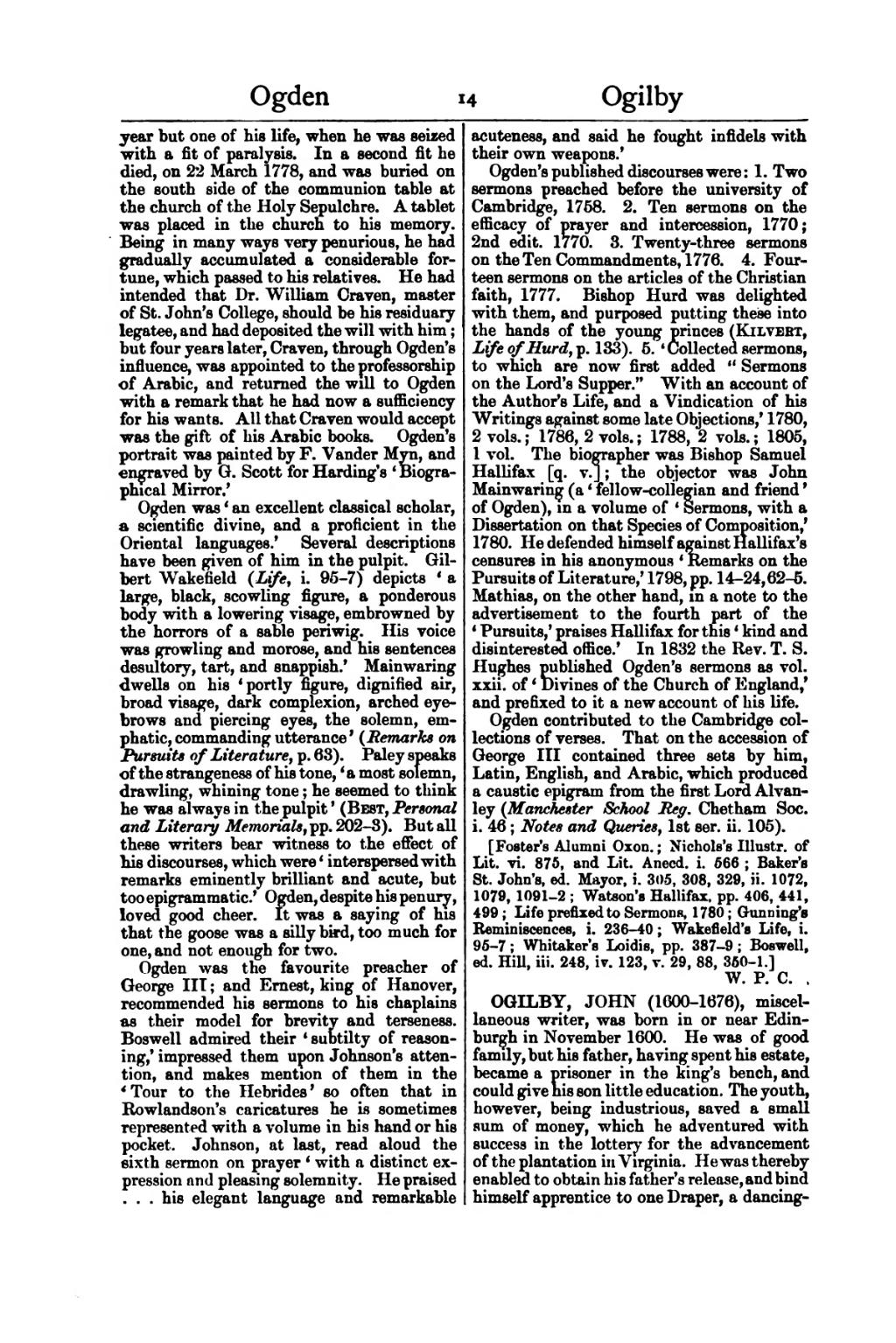year but one of his life when he was seized with a fit of paralysis. In a second fit he died, on 22 March 1778, and was buried on the south side of the communion table at the church of the Holy Sepulchre. A tablet was placed in the church to his memory. Being in many ways very penurious, he had gradually accumulated a considerable fortune, which passed to his relatives. He had intended that Dr. William Craven, master of St. John's College, should be his residuary legatee, and had deposited the will with him; but four years later, Craven, through Ogden's influence, was appointed to the professorship of Arabic, and returned the will to Ogden with a remark that he had now a sufficiency for his wants. All that Craven would accept was the gift of his Arabic books. Ogden's portrait was painted by F. Vander Myn, and engraved by G. Scott for Harding's 'Biographical Mirror'.
Ogden was 'an excellent classical scholar, a scientific divine, and a proficient in the Oriental languages.' Several descriptions have been given of him in the pulpit. Gilbert Wakefield (Life, i. 95-7) depicts 'a large, black, scowling figure, a ponderous body with a lowering visage, embrowned by the horrors of a sable periwig. His voice was growling and morose, and his sentences desultory, tart, and snappish.' Mainwaring dwells on his 'portly figure, dignified air, broad visage, dark complexion, arched eyebrows and piercing eyes, the solemn, emphatic, commanding utterance' (Remarks on Pursuits of Literature, p. 63). Paley speaks of the strangeness of his tone, 'a most solemn, drawling, whining tone; he seemed to think he was always in the pulpit' (Best, Personal and Literary Memorials p. 202-3). But all these writers bear witness to the effect of his discourses, which were 'interspersed with remarks eminently brilliant and acute, but too epigrammatic.' Ogden, despite his penury, loved good cheer. It was a saying of his that the goose was a silly bird, too much for one, and not enough for two.
Ogden was the favourite preacher of George III; and Ernest, king of Hanover, recommended his sermons to his chaplains as a model for brevity and terseness. Boswell admired their 'subtilty of reasoning,' impressed them upon Johnson's attention, and makes mention of them in the 'Tour of the Hebrides' so often that in Rowlandson's caricatures he is sometimes represented with a volume in his hand or his pocket. Johnson, at last, read aloud the sixth sermon on prayer 'with a distinct expression and pleasing solemnity. He praised … his elegant language and remarkable acuteness, and said he fought infidels with their own weapons.
Ogden's published discourses were:
- Two sermons preached before the university of Cambridge, 1758.
- Ten sermons on the efficacy of prayer and intercession, 1770; 2nd edit. 1770.
- Twenty-three sermons on the Ten Commandments, 1776.
- Fourteen sermons on the articles of the Christian faith, 1777. Bishop Hurd was delighted with them, and purposed putting these into the hands of the young princes (Kilvert, Life of Hurd, p. 133).
- 'Collected sermons, to which are now first added "Sermons on the Lord's Supper." With an account of the Author's Life, and a Vindication of his Writings against some late Objections,' 1780, 2 vols.; 1786, 2 vols.; 1788, 2 vols.; 1805, 1 vol.
The biographer was Bishop Samuel Hallifax [q. v.]; the objector was John Mainwaring (a 'fellow-collegian and friend' of Ogden), in a volume of 'Sermons, with a Dissertation on that Species of Composition,' 1780. He defended himself against Hallifax's censures in his anonymous 'Remarks on the Pursuits of Literature,' 1798, pp. 14-24, 62-6. Mathias, on the other hand, in a note to the advertisement to the fourth part of the 'Pursuits,' praises Hallifax for this 'kind and disinterested office.' In 1832 the Rev. T. S. Hughes published Ogden's sermons as vol. xxii. of 'Divines of the Church of England,' and prefixed to it a new account of his life.
Ogden contributed to the Cambridge collections of verses. That on the accession of George III contained three sets by him, Latin, English, and Arabic, which produced a caustic epigram from the first Lord Alvanley (Manchester School Reg. Chetham Soc. i. 46; Notes and Queries, 1st ser. ii. 105).
[Foster's Alumni Oxon.; Nichols's Illustr. of Lit. vi. 875, and Lit. Anecd. i. 566; Baker's St. John's, ed. Mayor, i. 305, 308, 320, ii. 1072, 1079, 1091-2; Watson's Hallifax, pp. 406, 441, 409; Life prefixed to Sermons, 1780; Gunning's Reminiscences, i. 236-40; Wakefield's Life, i. 95-7; Whitaker's Loidis, pp. 387-9; Boswell, ed. Hill, iii. 248, iv. 123, v. 29, 88, 350-1.]
OGILBY, JOHN (1600–1676), miscellaneous writer, was born in or near Edinburgh in November 1600. He was of good family, but his father, having spent his estate, became a prisoner in the king's bench, and could give his son little education. The youth, however, being industrious, saved a small sum of money, which be adventured with success in the lottery for the advancement of the plantation in Virginia. He was thereby enabled to obtain his father s release, and bind himself apprentice to one Draper, a dancing-
